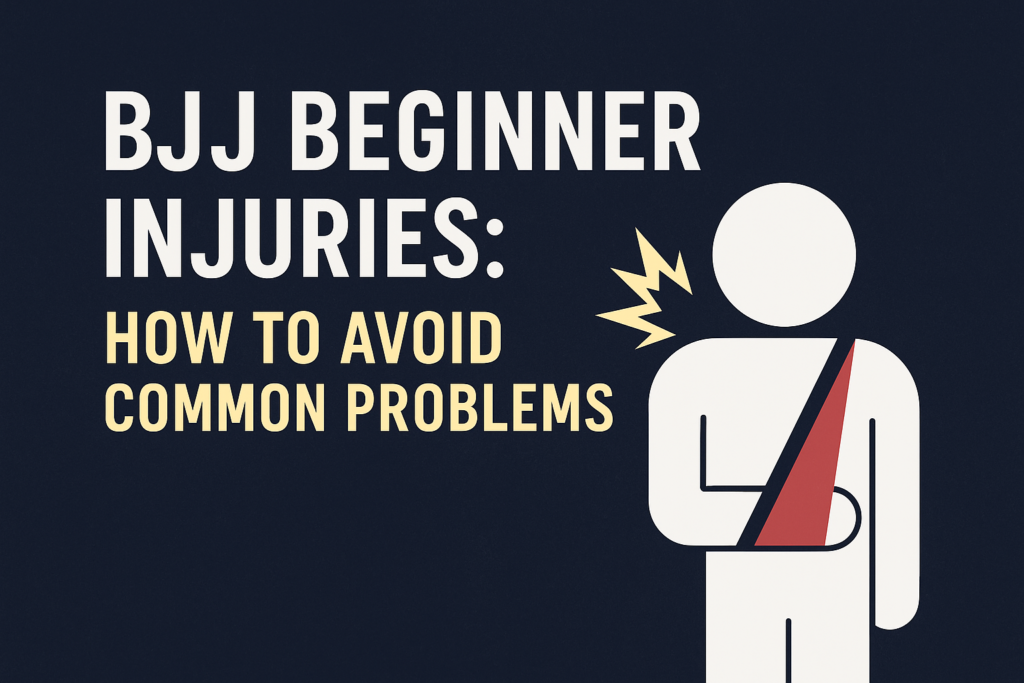Written By; BJJ Black Belt – BJJ Black Belt
Reviewed By: BJJ Black Belt – Dr. Logan Authement, D.C.
BJJ Beginner Injuries: Common Problems and How to Avoid Them
Starting Brazilian Jiu Jitsu is an exciting step toward building strength, confidence, and resilience. But as with any contact sport, new students sometimes face setbacks in the form of injuries. The good news? Most BJJ beginner injuries can be prevented with awareness, preparation, and the right training habits.
This guide covers the most common issues new students face, how to avoid them, and what to do if you encounter bumps along the way.
The Most Common BJJ Beginner Injuries
While Brazilian Jiu Jitsu is generally safer than striking-based martial arts, beginners sometimes experience:
-
Finger and Grip Strains – Over-gripping the gi can lead to sore fingers and tendon issues.
-
Neck Pain – Caused by poor posture or resisting submissions improperly.
-
Shoulder Tweaks – Often from white belts muscling out of armlocks or kimuras.
-
Knee Injuries – Especially during takedowns or if legs are trapped awkwardly.
-
Rib Bruises – Common when learning top control or defending pressure.
These are rarely serious if addressed early, but ignoring them can turn minor aches into long-term problems.
Why BJJ Beginner Injuries Happen
The majority of injuries happen for three reasons:
-
Tension and stiffness. Beginners often hold their breath and tense up instead of flowing.
-
Lack of tap awareness. Not tapping early enough when caught in a submission.
-
Overtraining. Jumping into too many classes per week without letting the body recover.
Recognizing these patterns early is key to avoiding setbacks.
How to Prevent Common BJJ Injuries
1. Tap Early, Tap Often
The golden rule. Tapping isn’t losing — it’s learning. Tapping before pain arrives prevents most submission-related injuries.
2. Warm Up Intentionally
Don’t treat the warmup as optional. Light movement, stretching, and drilling prepare your joints and muscles for rolling.
3. Focus on Technique, Not Strength
Trying to muscle through positions leads to sloppy movement and stress on your joints. Trust the technique and breathe.
4. Communicate With Your Partner
Let your training partners know if you’re brand new, dealing with soreness, or want to roll light. Communication reduces accidental intensity.
5. Prioritize Rest and Recovery
Even the best training plan fails without proper recovery. Stretching, hydration, and sleep are essential for avoiding injuries.
What to Do If You Get Injured in BJJ
Despite best efforts, sometimes BJJ beginner injuries still happen. When they do:
-
Stop training immediately. Don’t try to push through pain.
-
Seek professional medical advice if the pain persists or mobility is compromised.
-
Focus on what you can do. If your hand is hurt, maybe you can drill footwork or watch instructional videos.
A temporary setback doesn’t mean you’re done. With the right mindset, you’ll return stronger.
The White Belt Mindset on Injuries
Injuries can be frustrating, but they’re also an opportunity to learn. Every white belt faces challenges — the ones who succeed are those who adapt, listen to their bodies, and keep moving forward. By preventing BJJ beginner injuries with smart habits, you set yourself up for years of progress on the mats.
Want to dive deeper into staying safe on the mats? Explore our full pillar page Avoid Injuries & Recover Smarter in BJJ, where you’ll find more guides on recovery, soreness, and long-term training health.
👉 Continue reading in this series:
And remember, our full resource hub is here: White Belt Jiu Jitsu: Complete Beginner’s Guide
Train Safely with Us in Thibodaux
The best way to prevent bjj beginner injuries is training in the right environment. At Next Generation Martial Arts in Thibodaux, our structured program helps beginners build confidence while staying safe.

